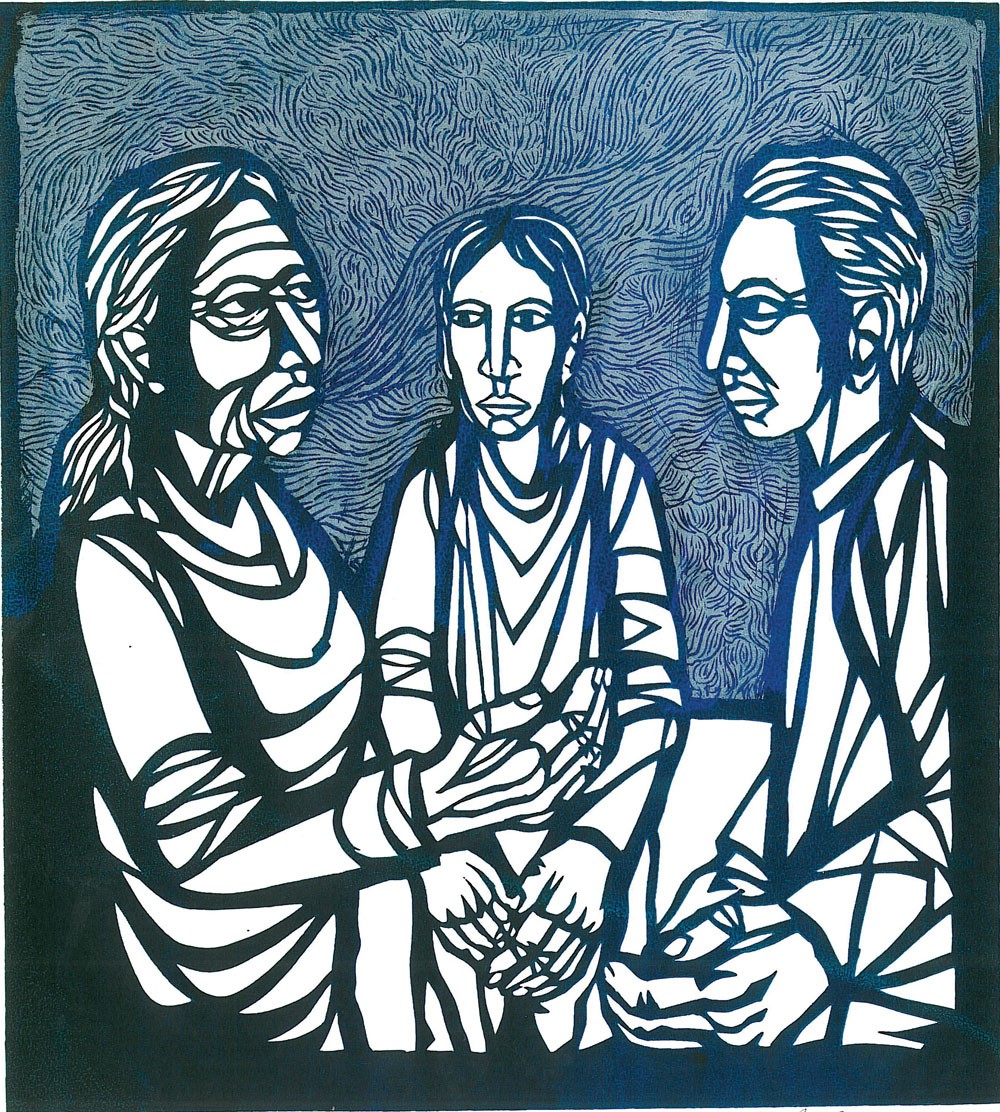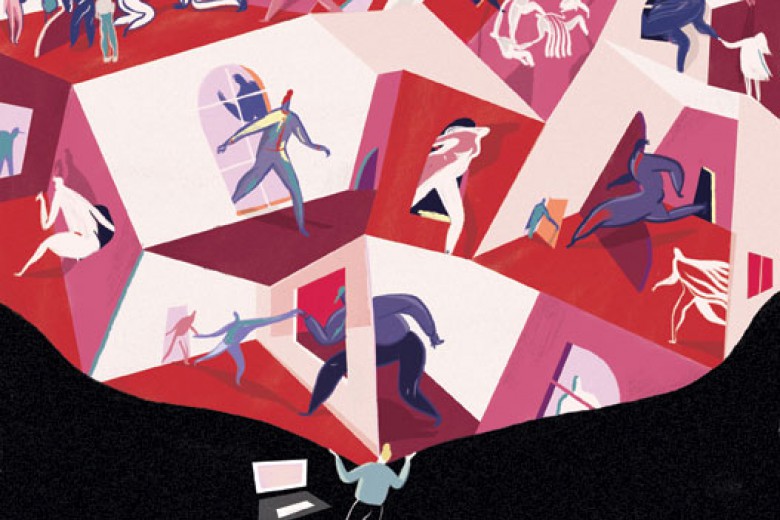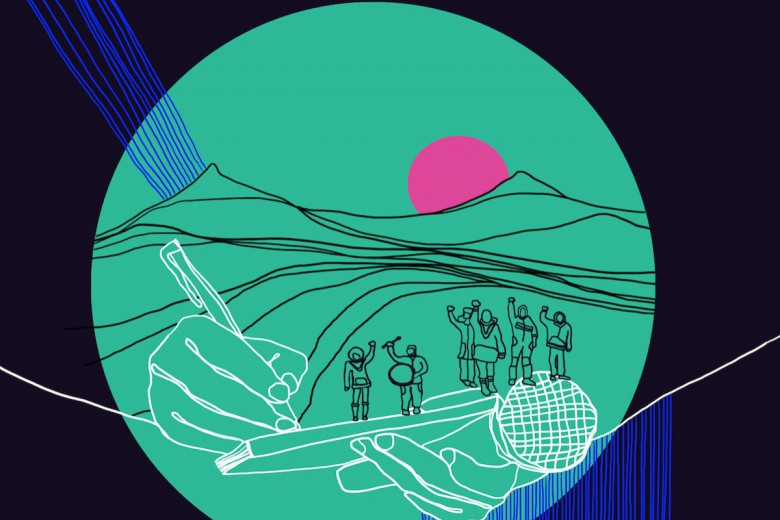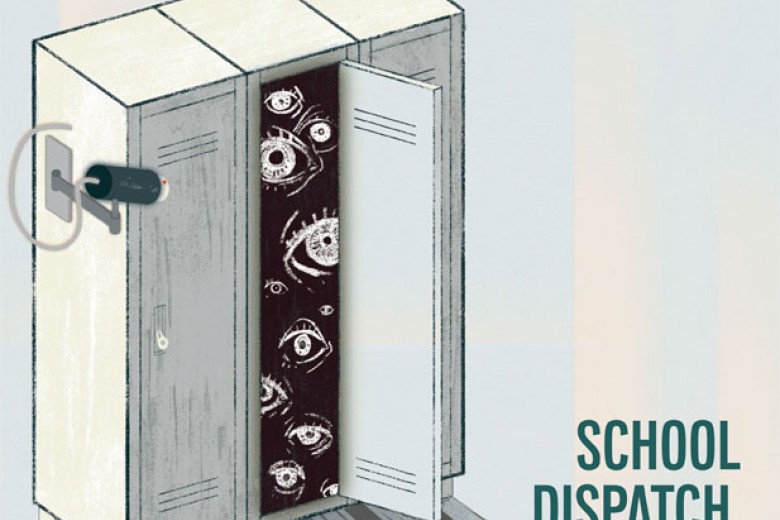
Ceferina Sánchez García stands in front of the doorway to her kitchen. Inside, a kitten sleeps curled in a ball at the edge of the earthen stove, where the last of the tortillas are cooking over the fire. It has just stopped raining, and the lush, forested mountains surrounding the community of La Tejera seem especially green.
This is exactly where the 73-year-old grandmother stood when the police came looking for her son in November 2013, seven months into an ongoing Indigenous Lenca blockade against the construction of a hydroelectric dam in western Honduras. Tomás García, an outspoken blockade participant like her son, had previously been shot and killed by a soldier. Others have been attacked this year.
Sánchez García grabs a large wooden stick and holds it diagonally against her slight frame. “They aimed their guns at me from over there,” she says, indicating a spot 20 feet away. Unable to find her son, the police insulted Sánchez García’s grandson, kicked him several times, and left. “I wasn’t afraid,” she says. “We’re against the dam, for the land.”
Criminalization of, attacks against, and murders of Indigenous land defenders, LGBTQ organizers, journalists, human rights activists, and political opponents have become the norm in Honduras, and many have fled for their lives. Militarization, violence, and repression have risen dramatically since the June 28, 2009, coup d’état. To cope with increasing threats and attacks, human rights defenders and media workers have been developing networks and alert systems.
Bertha Oliva takes a moment to find the words to describe her alarm at the unfolding reality. She sees an increasing resurgence of the policies and death squad activities of the ’80s, and it’s not a comparison she makes lightly. In 1981, her husband was abducted from their home by six men, presumably from the state death squad, Battalion 3-16. He was never heard from again. Oliva co-founded the Committee of Relatives of the Detained-Disappeared in Honduras and is currently the organization’s general coordinator.
“Since 2009, one can see how the situation in the country has suffered a profound setback in terms of the protection of human rights,” says Oliva. “I didn’t think we were going to live through this again because we had continuously worked so that we wouldn’t have to.”
Honduras holds the notorious distinction of having the highest per capita homicide rate in the world. It also ranks as one of the most dangerous countries for journalists. LGBTQ organizations have documented more than 100 murders of transgender, lesbian, and gay Hondurans since the 2009 coup. In the same time frame, more than 100 farmworker movement activists and land occupation participants have been killed in the lower Aguan valley region alone. Indigenous land defenders and community leaders struggling against natural resource extraction and energy projects have also been targeted.
Canada, the U.S., and international financial institutions are pouring millions into security programming in the region, in part to bolster the investigative capacity of police forces and the judicial system, but only an estimated one per cent of crimes are ever investigated in Honduras. Journalism in the Shadow of Impunity, a 2014 report by the international human rights program at the University of Toronto’s faculty of law, PEN Canada, and PEN International, points to the historical legacy of impunity as a principal determinant of today’s abuses and lack of investigation.
“The roots of the crisis lie further back in Honduras’ history, notably in its failure during the demilitarization process that began in the 1980s to hold those who had committed serious human rights violations accountable for their actions,” wrote the report’s authors. The conclusion is echoed by Oliva, whose words grace the cover of the report: “When we allow impunity for human rights violations, we see the crimes of the past translated into the crimes of the future.”
Despite this record of impunity, an initiative to protect today’s human rights defenders and journalists is moving forward. In June, the Law on Protection of Human Rights Defenders, Journalists, Social Communicators and Operators of Justice was passed by the Honduran Congress. The law was initially a joint project of three national human rights organizations, but work on the proposed legislation was cut short by the coup in 2009. When a government agency picked up the initiative after the coup, the Committee of Relatives of the Detained-Disappeared in Honduras declined to participate. The situation has changed, says Oliva, and a human rights law isn’t going to repair a broken democracy or spark a return to rule of law.
“Laws aren’t what are needed in Honduras. I don’t think the answer is more laws because at the same time this law to protect human rights is approved, other laws that restrict rights and violate human rights are being passed,” says Oliva. “If there’s no political will to respect human rights in practice, the most amazing laws can be created but the results will still be against those of us who defend human rights, against those of us who defend life.”
Faced with the state’s practical intransigence, media workers and human rights defenders have been developing networks and other strategies. The Committee for Free Expression has been building the RAPCOS project, a web of local networks around the country. The initiative brings together journalists, local organizations, and others to develop capacity for an immediate response and alert system if a media worker is threatened or attacked.
Dina Meza is an independent journalist who knows all too well what it’s like to be targeted. She has been threatened and followed due to her work reporting on human rights issues. Phone calls and text messages have included threats of sexual violence and allusions to the disappearance of her teenage daughter. Meza spent several months abroad for the safety of herself and her family.
These days, Meza is organizing PEN Honduras as a national branch of PEN International, a worldwide writers’ organization dedicated to freedom of expression and to speaking out on behalf of writers who are threatened, jailed, or killed for their views. The initiative was inspired in large part by the 2014 Journalism in the Shadow of Impunity report, which concluded that journalists in Honduras needed to organize themselves in the face of continued threats.
“It seemed like a really interesting initiative,” says Meza, who was interviewed for the report and is now the president of the provisional board of directors for the proposed PEN Honduras. The initiative is bringing together writers, journalists, artists, human rights defenders, lawyers, and others working for freedom of expression in the realms of art and culture as well as literature and journalism.
For now, the incipient organization is focused on spreading awareness about its existence and getting more people and organizations on board. “Our goal isn’t to replicate the work being done by other organizations but to organize different actions,” Meza says, explaining that cultural and artistic freedom of expression isn’t something addressed by existing organizations in the country. The provisional board has developed a three-year work plan, but the next hurdle will be approval of PEN Honduras as a national branch at the 80th PEN International Congress being held in Kyrgyzstan from September 29 to October 2. “We’re making progress,” she says.
Like journalists, human rights organizations are working to link human rights defenders around the country. “Human rights have always been an issue debated in the big cities like Tegucigalpa and San Pedro Sula,” says Oliva. But defenders in rural and Indigenous communities fighting land grabs, mining, and energy projects – like Sánchez García and her son in La Tejera – are increasingly at risk, she says. “We see the need to empower and make visible those who are struggling on the ground.”
For now, hard times are here to stay in Honduras, says Oliva, and things will probably get worse before they get better. But she remains hopeful that the road to justice and a return to democracy can be constructed from below, one step at a time.
“If we wait for the state or the government to solve the problems of inequality, social injustice, and human rights violations, we’re not going to see it happen, even in the long term,” she says. “It’s the people who have to organize themselves, to rise up.”





_copy_780_520_s_c1.png)
